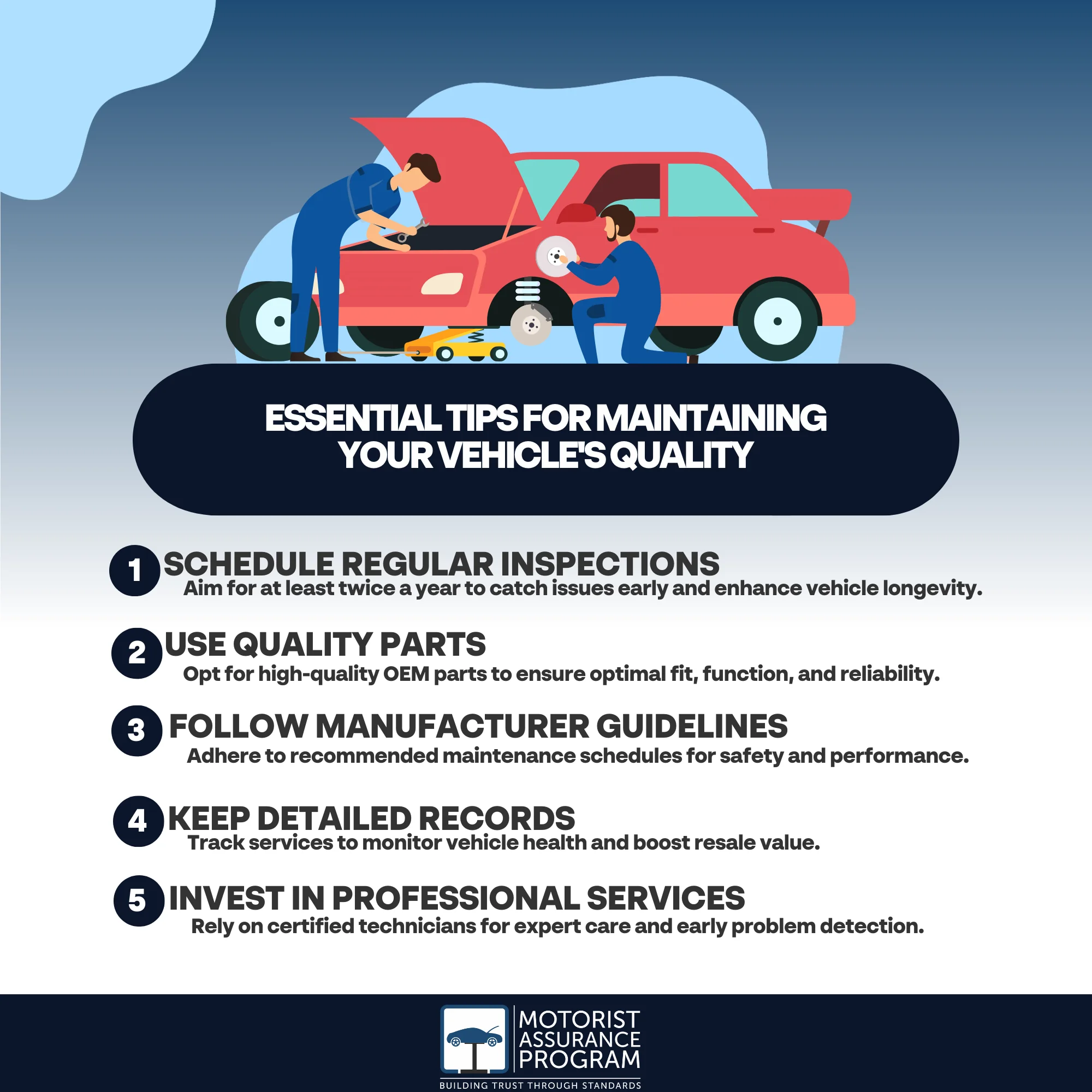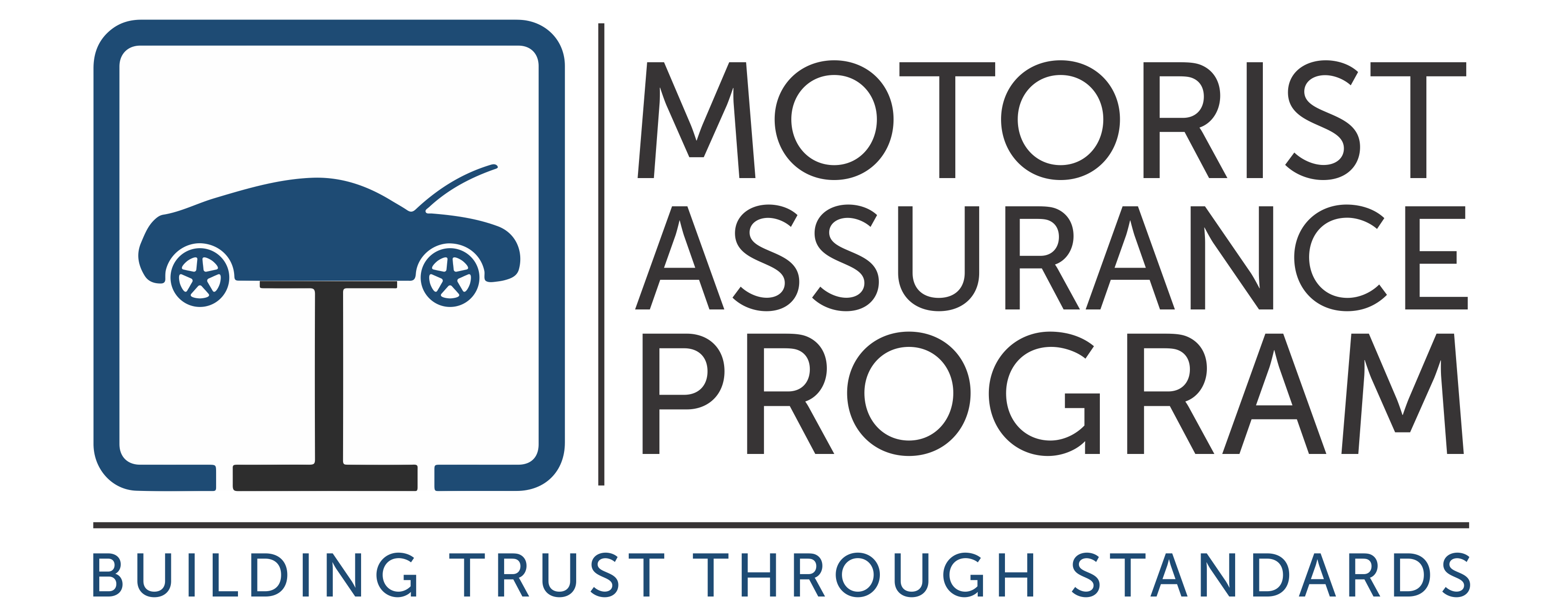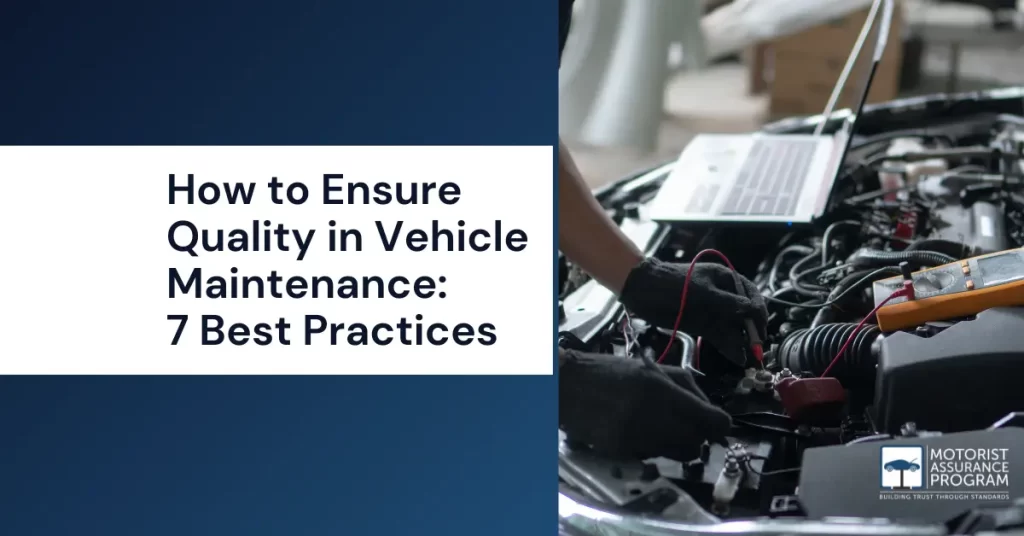To maintain your vehicle’s performance, focus on seven essential tips. First, schedule regular inspections; aim for at least twice a year, especially for older cars. Use quality, recommended parts to guarantee efficiency and longevity. Always follow the manufacturer’s guidelines for maintenance schedules. Keep detailed records of services to track and enhance reliability. Invest in professional services from certified technicians who can expertly diagnose and repair issues. Regularly monitor fluid levels, addressing changes immediately. Stay informed on maintenance updates through apps or newsletters, making sure you never miss important reminders about your vehicle’s care. There’s plenty more to discover about effective vehicle maintenance!

Key Takeaways
-
Schedule regular inspections at least twice a year to catch issues early and enhance vehicle longevity and performance.
-
Use high-quality, OEM parts for repairs to ensure optimal fit, function, and vehicle reliability.
-
Follow the manufacturer’s maintenance guidelines closely to maintain safety and vehicle performance.
-
Keep detailed maintenance records to track services and increase resale value while aiding mechanic discussions.
-
Invest in professional services from certified technicians for expert care and early problem detection.
Regular Inspections
When it comes to keeping your vehicle in top shape, don’t overlook the importance of regular inspections. These inspections serve as critical preventive measures that can save you time and money in the long run. By evaluating your vehicle’s condition regularly, you can identify potential issues before they escalate into costly repairs.
Incorporating driver assistance technologies into your vehicle can also enhance safety during your inspections, as these features help monitor and maintain ideal driving conditions.
So, how often should you schedule these inspections? It largely depends on your driving habits and the manufacturer’s recommendations. Generally, aiming for at least twice a year is a good practice, but if you frequently drive in harsh conditions or have an older vehicle, you might want to increase your inspection frequency.
During these inspections, be sure to check essential components like brakes, tires, and fluid levels. Addressing minor problems early on can enhance your vehicle’s performance and reliability. Plus, it gives you peace of mind knowing that your car is running smoothly and safely.
Incorporating regular inspections into your vehicle maintenance routine not only extends the life of your car but also keeps you and your passengers safe on the road. Take charge of your vehicle’s health, and you’ll drive with confidence for miles to come.
Use Quality Parts
How can using quality parts impact your vehicle’s performance? When you choose high-quality parts, you’re not just investing in your vehicle; you’re enhancing its overall efficiency and reliability. Quality parts, whether they’re replacements or aftermarket upgrades, guarantee that your vehicle runs smoothly and lasts longer.
They’re designed to meet or exceed original specifications, which means better fit and function. Additionally, using fuel economy information can guide you in selecting parts that maximize your vehicle’s performance.
Using essential tools during installation is vital. Properly fitted parts work in harmony with your vehicle’s systems, reducing wear and tear. For example, if you opt for subpar brake pads, you might save money initially, but you could face costly repairs down the road from compromised safety and performance.
Moreover, quality parts can improve fuel efficiency and boost your vehicle’s power output, making everyday driving more enjoyable. When you’re passionate about your vehicle, it’s satisfying to know you’re providing it with the best.
Follow Manufacturer Guidelines
To keep your vehicle running smoothly, it’s essential to follow the manufacturer’s guidelines. Start by checking your owner’s manual for specific recommendations on maintenance schedules and parts.
For electric and hybrid vehicles, adhering to these guidelines is even more important due to unique components like high-voltage batteries and advanced electric systems. Regular inspections and using the recommended parts can make a significant difference in your car’s performance and longevity, ensuring you stay safe on the road.
Additionally, understanding the maintenance requirements specific to electric vehicle safety standards can further enhance your vehicle’s reliability.
Check Owner’s Manual
Checking your owner’s manual is essential for maintaining your vehicle properly. This guide holds key information on your car’s specifications, recommended maintenance schedules, and service intervals. By understanding the owner’s manual importance, you can guarantee your vehicle runs efficiently and safely.
Each vehicle is unique, and the owner’s manual provides tailored maintenance tips that help you avoid issues down the road. Regularly reviewing this manual can save you time and money by helping you identify when specific parts need attention, such as oil changes or tire rotations.
It’s not just about following instructions; it’s about empowering yourself with knowledge.
In addition, the manual often contains troubleshooting tips for common problems, which can save you from unnecessary trips to the mechanic. You’ll feel more confident tackling basic maintenance tasks yourself, like checking fluid levels or replacing wiper blades.
Schedule Regular Inspections
Regular inspections are essential for ensuring your vehicle remains in ideal condition and adheres to safety standards. By scheduling these inspections, you take important preventive measures that can save you time and money on future repairs.
It’s vital to follow the manufacturer’s guidelines when determining how often your vehicle should be inspected.
Create an inspection checklist that covers key components, such as brakes, tires, lights, and fluid levels. This checklist not only helps you stay organized but also allows you to identify any potential issues before they escalate.
Make it a habit to review this checklist during your inspections, ensuring that you’re not overlooking anything critical.
Keep in mind that regular inspections contribute greatly to your vehicle’s longevity and performance. They also enhance your safety on the road, giving you peace of mind while driving.
Plus, you’ll be able to maintain your vehicle’s resale value by staying on top of its condition.
Use Recommended Parts
Using parts recommended by your vehicle’s manufacturer is key to maintaining its performance and reliability. OEM parts are designed specifically for your vehicle, ensuring perfect fit and function.
While you might consider aftermarket options, it’s vital to perform compatibility checks to avoid issues down the road.
Using the wrong parts can lead to warranty implications, so always check your warranty coverage before making a decision. Cost considerations are important, too; while OEM parts might seem pricier upfront, they often provide better longevity and performance benefits, saving you money in the long run.
When sourcing suppliers, look for authorized dealers or trusted auto parts stores that can provide the right options.
Installation tips are also essential—ensure you follow the manufacturer’s guidelines for a smooth installation process. If you’re unsure about any steps, consult a professional mechanic to avoid potential pitfalls.
Keep Detailed Records
Keeping detailed records of your vehicle’s maintenance is essential for ensuring its longevity and performance. By tracking your maintenance history, you not only stay organized but also empower yourself to make informed decisions about your vehicle.
Consider keeping a dedicated notebook or using an app to log every service, including oil changes, tire rotations, and any repairs. These records can help you identify patterns in repairs and maintenance needs, which can be invaluable when budgeting for future repair costs.
If a recurring issue arises, you’ll have the documentation to discuss it with a mechanic, potentially saving you time and money. Plus, having a complete maintenance history can boost your vehicle’s resale value, as prospective buyers appreciate knowing how well you’ve cared for the car.
Don’t forget to keep receipts for parts and services, as they serve as proof of maintenance and can aid in warranty claims.
Remember, being proactive about documenting your vehicle’s care means you’re taking an important step toward preserving its value and ensuring your safety on the road.
Invest in Professional Services
When it comes to keeping your vehicle in top shape, investing in professional services is essential.
Choosing certified technicians guarantees that your car gets the expert care it needs, while sticking to a regular maintenance schedule can prevent costly repairs down the road.
Choose Certified Technicians
Choosing certified technicians for your vehicle maintenance can make a significant difference in its performance and longevity. When you opt for professionals with proper certification, you’re ensuring that they’ve undergone rigorous technician training. This training equips them with the latest knowledge and skills necessary to address your vehicle’s specific needs.
Certification importance can’t be overstated. Certified technicians are often up-to-date with industry standards and best practices, which means they can diagnose issues more accurately and efficiently. They also have access to advanced tools and technologies that non-certified mechanics might not.
By investing in certified professionals, you’re not just getting repairs; you’re investing in peace of mind. These experts know the ins and outs of various makes and models, and they can spot potential problems before they escalate, saving you time and money in the long run.
Moreover, certified technicians usually offer warranties on their work, providing additional assurance that your vehicle is in good hands.
Regular Maintenance Schedule
Investing in a regular maintenance schedule is key to ensuring your vehicle runs smoothly for years to come. By committing to seasonal maintenance, you not only prolong your car’s life but also enhance its performance. Regular check-ups allow you to catch small issues before they become major problems, saving you time and money in the long run.
Incorporating preventative measures into your routine is essential. Start with a checklist that includes oil changes, tire rotations, and fluid checks. These tasks might seem minor, but they’re vital for keeping your car in top shape.
Consider seasonal adjustments, like checking your brakes before winter or ensuring your air conditioning works in summer.
Don’t hesitate to seek professional help; certified technicians can provide insights that you might overlook. They can recommend additional services tailored to your vehicle’s specific needs.
Remember, a well-maintained vehicle isn’t just about safety; it’s also about peace of mind. You’ll drive with confidence, knowing you’ve taken the necessary steps to protect your investment.
Monitor Fluid Levels
Keeping an eye on fluid levels is essential for your vehicle’s performance and longevity. Regularly checking various fluid types—like engine oil, coolant, brake fluid, and transmission fluid—can help prevent costly repairs down the road. Each of these fluids plays a critical role in your vehicle’s operation, ensuring everything runs smoothly.
You should check these levels at least once a month or before long trips. If you notice any fluid changes, such as a drop in levels or unusual colors, it’s crucial to address the issue immediately. Low oil levels can lead to engine damage, while insufficient coolant can cause overheating.
When you spot a problem, don’t hesitate to consult your vehicle’s owner manual for guidance on the proper fluid types and how to top them off. If you’re unsure, a professional mechanic can assist you.
Stay Informed on Updates
Staying updated on your vehicle’s maintenance requirements is vital for ideal performance and safety.
With advancements in vehicle technology, it’s imperative to keep pace with changes and recommendations. Regular updates can help you avoid costly repairs and guarantee your car runs smoothly.
You can utilize various resources to stay informed, including:
-
Manufacturer’s guidelines: Always refer to your vehicle’s manual for specific maintenance schedules.
-
Maintenance apps: These handy tools can send you reminders for oil changes, tire rotations, and other essential services.
-
Online forums: Engaging with other vehicle owners can provide insights and tips on common issues and solutions.
-
Local workshops: Stay connected with your mechanic to receive updates on any recalls or necessary repairs.
-
Newsletters: Subscribe to newsletters from automotive websites to stay updated on the latest vehicle technology trends and maintenance tips.
Frequently Asked Questions
How Often Should I Replace My Vehicle’s Battery?
You should replace your vehicle’s battery every 3 to 5 years. Regular battery testing helps determine its lifespan, so keep an eye on performance to avoid unexpected failures and guarantee reliable starts.
What Are Signs That My Tires Need Replacement?
When it comes to tire wear, you’ll want to keep an eye on tread depth. If you notice uneven wear, visible cracks, or if the tread’s less than 2/32 inches, it’s time to replace ’em.
Can I Do My Own Oil Changes?
Yes, you can definitely do your own oil changes! It’s a great way to save money and learn DIY maintenance. Plus, regular oil changes enhance engine performance and longevity, providing essential oil change benefits for your vehicle.
How Can I Tell if My Brakes Need Servicing?
Your brakes shouldn’t scream like a banshee! Listen for brake noise, feel for vibrations, and check your brake fluid level. If something feels off, don’t ignore it; get them serviced before trouble strikes!
What Should I Do if My Check Engine Light Comes On?
When your check engine light comes on, don’t ignore it. Use diagnostic tools to diagnose the issue. Pay attention to warning signals, and consider visiting a mechanic for a thorough inspection to avoid further damage.
Conclusion
By prioritizing these vehicle maintenance tips, you’re setting yourself up for a smoother ride, much like a well-tuned orchestra playing in harmony. Regular inspections, quality parts, and detailed records not only enhance your vehicle’s performance but also prolong its life. Remember, investing time and effort into maintenance today can save you from costly repairs tomorrow. So, take charge and keep your vehicle in top shape; your future self will thank you for it.


